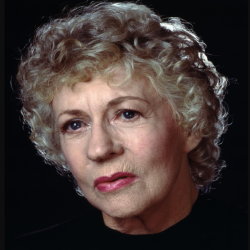
Uta Hagen
| Date of Birth | : | 12 Jun, 1919 |
| Date of Death | : | 14 Jan, 2004 |
| Place of Birth | : | Göttingen, Germany |
| Profession | : | Actress |
| Nationality | : | German, American |
Uta Thyra Hagen was a German-American actress and theatre practitioner. She originated the role of Martha in the 1962 Broadway premiere of Who's Afraid of Virginia Woolf? by Edward Albee, who called her "a profoundly truthful actress."
Biography
Hagen’s family moved to the U.S. when she was seven. After studying for a short time at the Royal Academy of Dramatic Art in London and then at the University of Wisconsin, she made her professional debut when she was 18 in Eva Le Gallienne’s production of Hamlet. Hagen made her Broadway debut in 1938 as Nina in The Seagull, a production that starred Alfred Lunt and Lynn Fontanne. That same year Hagen performed opposite José Ferrer in The Latitude of Love. Hagen and Ferrer were later married, and over the 10 years of their marriage, they acted together in several productions.
In 1947 Hagen appeared in The Whole World Over along with Herbert Berghof, whom she married in 1951. The two founded and began teaching at the Herbert Berghof Studio (known as the HB Studio) in New York City’s Greenwich Village; it became one of the city’s best performing arts schools. In 1948 Hagen starred as Blanche DuBois in the road company production of A Streetcar Named Desire and then took over the role on Broadway, and in 1950 she appeared in the role for which she won her first Tony, Georgie in Clifford Odets’s The Country Girl.
Hagen was blacklisted in the 1950s but made her stage comeback in Who’s Afraid of Virginia Woolf? (1962). She also traveled with that play to London—winning the Drama Critics Award. In 1999 Hagen was honoured with her third Tony Award, this one for lifetime achievement. In addition, Hagen wrote the acting textbooks Respect for Acting (1973) and A Challenge for the Actor (1991).
Quotes
One cannot demand of art that it pay you in any other way than in the satisfaction of the work itself.
For some strange reason, we believe that anyone who lived before we were born was in some peculiar way a different kind of human being from any we have come in contact with in our own lifetime. This concept must be changed; we must realize in our bones that almost everything in time and history has changed except the human being.
Once in a while, there's stuff that makes me say, That's what theatre's about. It has to be a human event on the stage, and that doesn't happen very often.
If you want a bourgeois existence, you shouldn't be an actor. You're in the wrong profession.
Keep pace with the present. Take a trip to the moon. envision the future.
The need to be loved and protected is at a peak when we feel abandoned and are particularly vulnerable to difficult circumstances.
It must be noted that it is often the colleague or direct disciple of a new thinker who gets stuck in literal interpretations of the work, tending to freeze the new ideas and language into an inflexible, static condition.
I love going to the movies; I love watching good movie actors. They must know something I don't.
We were not allowed to say, Screw, but we could say, Hump the hostess, because hump is in Shakespeare.
I love playing Chekhov. That's the hardest; that's why I love it most.
